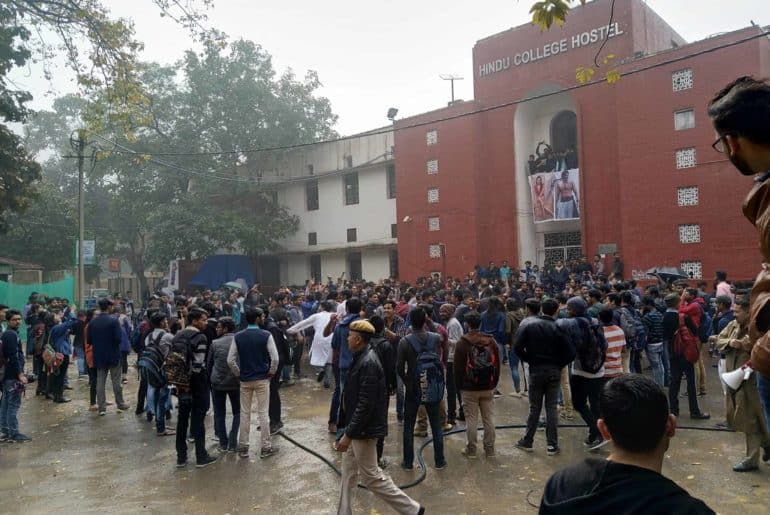This Valentine’s Day, let’s take out a page from University’s history. The chapter is regarding Hindu College’s (in)famous Virgin Tree (V-tree).
For those who are untouched with the lore of the V-tree, it’s is a tree present near the Hindu College library which has been the site of a hostel ceremony observed every Valentine’s Day. A pundit from the hostel is appointed to do a puja around the tree which has condoms hanging from it and the poster of a Bollywood diva as Damdami Mai (any female celebrity in trend, hypersexualised for this purpose).
With the women’s hostel set up in recent years, a Love-Guru is also chosen to be worshipped by the women students. Yes, this is surely problematic but over the years, many saw this as just a casual joke in their ‘sex-driven college days’. The critics of the practice found their voices lost in oblivion. But since the past few years (especially last year), there was a whole clamour of voices echoing all across Hindu College.
Last year, the Women’s Development Cell of the College tried to reach an agreement with the Boys’ Hostel, who seemed to be pretty adamant on their stance of preserving the ‘College tradition’. But later on, the situation seemed to be manipulated, twisted, and turned a lot by the students and media alike, as the organisation Pinjratod too got involved, crossing the College’s gates on the eve of 14th February. This seemed to have hurt the ego of a majority of boys from the hostel, and they decided to conduct the V-Day puja with more pomp and fervour now. A few critics and Pinjratod members tried to raise slogans around the tree but to no avail.
Delving on last year’s incidents anymore would deserve a report of its own, and you can brush up your history with the Virgin Tree in DU Beat’s website itself. Now coming back to the present day, the situation seems to be quite perplexing. Ground reports suggest that a conscious voice among the students who stand against the V-tree ceremony has increased. At the same time, the ‘tradition preservers’ are still adamant.
On the 7th of February, talks tried to take place at the College’s New Academic Block but the adamant ones didn’t even agree to sit down at the discussion. Most of them stood tall and shushed the critics, justifying that they just want this puja to happen for the sake of the College’s culture and are not misogynistic, unlike the ceremony which they so vehemently support.
The main points of critique around this V-day ceremony are that it adds to the narrow view of looking at a ‘desirable’ male or female. So, a person is desirable, only if he/she looks like a Hrithik Roshan or a Disha Patani? In their defence, the hostel feels that this ceremony should be taken as a fun activity and they tried to accommodate other sexualities too (through a tokenistic rainbow-coloured heart featured in a poster hanging from the tree last year). The very fact that a pundit is appointed and a Hindu-style puja takes place, bothers some. Hindu College has ‘Hindu’ in its name but is a secular space, with no benefits given to any one religion.
What will happen now on the 14th, that, only time will tell but there’s still some hope brewing among Hinduites. A source from the Girls’ Hostel told us that they are planning to run a campaign wherein, the critics can try and
simplify the entire matter and actually explain to people what is the V-tree and why they are opposing it. There
are also hushed-down talks happening for a possible alternative ceremony around the tree that would not offend any religion, caste, or gender.
An all-night protest on the event (not by Pinjratod) is also likely on the eve of Valentine’s. Whatever be the case, it’s evident that on Valentine’s Day, love might be in the air but with revolution…
Shaurya Singh Thapa
[email protected]


